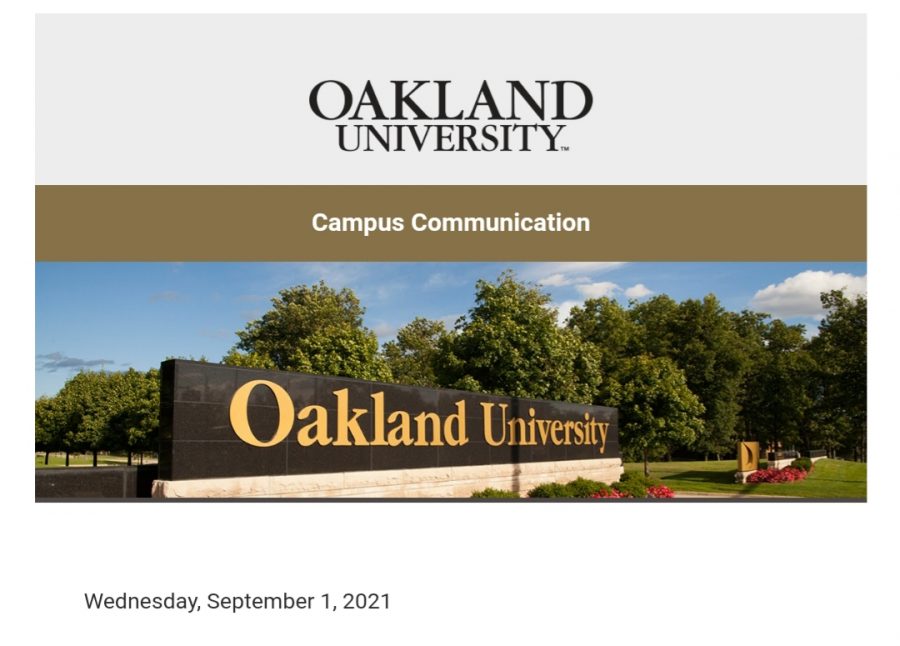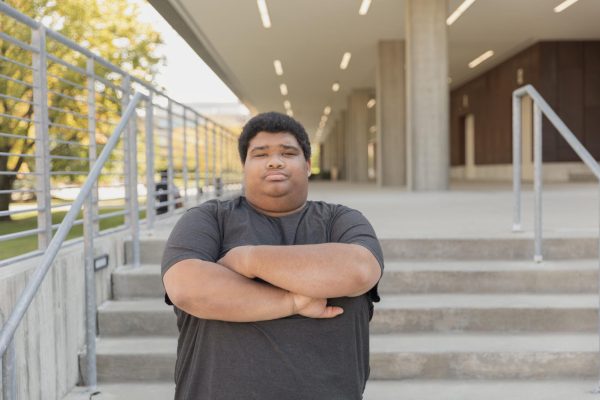Letter to the editor: our response to this morning’s unusual Campus Communication email
On Wednesday, September 1, just one day before the official start of classes, Oakland University updated the campus community on the state of contract negotiations with faculty via email. Misleading and devoid of context, the University’s email demands scrutiny. For that reason, we have annotated the message, subjecting it to the same kind of analytic procedures and tests-of-truth that we, and our faculty colleagues across disciplines, work hard to teach our students to perform. For those, including students, who may not have seen the email, we have reproduced the entirety of Oakland’s message below, with our annotations interspersed.
To the campus community,
The university has the right to do whatever it wants with its email system. Is it right, however, to use it as a negotiating tool? Is it right to use university email to publish disputed assertions as facts in order to make the faculty look irresponsible? The university, ostensibly, comprises all voices in its “community.” To seize upon this means of communication is uncomfortably close to the use of state-run television in autocratic countries.
Ten hours of contract negotiations facilitated by a state mediator on Tuesday welcomed progress toward a new faculty labor agreement.
Contract negotiations started in May. However, the university did not even propose an economic package until July. Then, less than a week before classes were set to start, the University took a long weekend off. An agreement could have been reached long ago but the university has clearly chosen to extend negotiations to the 11th hour. Doing so seems deliberately designed to cause faculty and students as much consternation and anxiety as possible. Is that good faith bargaining? How does that serve the university’s educational mission?
Also, the very presence of a mediator in these negotiations attests to the deeply contested nature of the negotiations. Both sides called for a negotiator because they could not agree on the basic terms of the negotiations, and certainly not on what might constitute “progress.”
Finally, “welcomed” is an odd word here. The metaphor suggests the hours of negotiation celebrated the arrival of “progress.” Perhaps “welcomed” was chosen over more logical choices like “led to” or “produced” because “welcomed” evokes warm feelings of universal approval. The grammatical structure of the sentence conceals the interest of the sentence, as if there were no possibility some might see the result of the ten hours as less than welcome.
Before the mediator adjourned the bargaining session and set it to resume at noon today, the university and the union agreed to a 24-hour extension of the current contract.
The only reason an “extension” makes sense is if both sides agree that the next 24 hours could produce movement that would lead to an agreement. If such movement is possible, why wait? Why did the university fail to offer any new economic proposals yesterday, after its long weekend off?
A primary, unresolved issue is a faculty union proposal to increase total compensation for part-time faculty by more than 10 percent.
“Primary” is a loaded, value-laden word here. It raises the question of whose values are embedded in that word? Reading the document will not produce any person willing to take responsibility for the interests this communication serves.
As for compensation, more than 10 percent of what? What is their current compensation? Is the current compensation of “part-time faculty” satisfactory as it stands? We don’t believe it is. We believe their labor is exploited. And note the omission here of the shameless, union-busting attempt to remove many of these same part-time faculty from the bargaining unit in a crassly opportunistic move based on an administrative technicality.
University negotiators view this focus as untenable.
Why is it untenable? Where are university funds going that make this untenable? Let’s read on.
Such a dedication of resources would negatively impact compensation for all other employees, including tenured and tenure-track faculty members, as well as divert resources away from areas more directly targeted for student success and research.
Notice the divide and conquer strategy at work here. Pitting the interests of one exploited group against other (more or less) exploited groups is nothing more than an attempt to chip away at the solidarity tenure track faculty, “part-time faculty” and administrative professional, clerical-technical and all other employee groups feel with each other.
And to what “areas” does OU refer? Why the lack of specificity here? What area could possibly be more targeted toward student success than the outstanding instruction provided by faculty, whether they are part-time or on the tenure track? And let’s not gloss over the absurdity inherent in “part-time faculty.” Does the designation “part-time” have any correlation with the work lives of the faculty it misnames? Do they work part time? No. Are their efforts really less targeted to student success than full-time faculty? No. What do “part-time” faculty do? They teach. They teach students. How many students do you think care which of their dedicated, hard-working professors are “part-time” and which “full-time”?
The university is therefore seeking more equitable compensation adjustments.
What does this phrase even mean? More equitable than what? Let’s consider: we contend that increasing the compensation of “part-time faculty” is a necessary component of “more equitable compensation adjustments” in recognition of the fact that part-time faculty provide instruction as valuable and vital as full-time faculty. Let’s also consider the equity of compensating the chief of staff $215,000, or the vice president of marketing, brand and communications $194,651 when the vast majority of faculty, whether full- or part-time make nowhere near that. Are these positions even necessary? Do these salaries not contribute to the $17 million shortfall? What would happen if OU compensated members of the “community” according to the contribution they make to its core mission? It appears to us that the university is “seeking more equitable compensation adjustments” in the wrong places.
University operating revenue is particularly limited this year due to an unprecedented, 8 percent enrollment drop from last year.
An enrollment drop that is largely attributable to a global pandemic. In recognition of this, the union proposed a shorter-term contract appropriate to these extraordinary circumstances– a proposal the university flatly refused to consider.
This has created a $17 million revenue shortfall.
Declining enrollments are indeed costly. They may even constitute a crisis. We don’t dismiss this real concern, one that does require sacrifice to solve. But is that decline single-handedly responsible for the “shortfall”? What about the COVID funds designated to help with this situation that the university chose to place into reserve? Where did they go? Do the compensation packages of the president and the provosts contribute to this shortfall? Why are those most vital to the institution’s misson, its teachers (and especially its most economically vulnerable teachers), being asked to bear the brunt of this sacrifice rather than the ever-growing number of highly-paid upper administrators?
Compounding the university’s concern is a dramatic decline in the number of high school graduates in Michigan. Despite these concerns, the university is still striving to increase overall compensation for all faculty in a new union contract, including special lecturers, in a fair, equitable and financially responsible manner.
Striving? Does offering a 0% raise for the faculty in 2021-22 qualify as “striving to increase compensation”? Does cutting contributions to health care qualify? How about slashing the discount the children of faculty receive for tuition at OU which costs the university nothing? Does that look like striving? We’d like to see one proposal the university offered that seeks to increase faculty compensation. This claim is frankly untrue.
The university negotiating team will present a proposal consistent with these objectives when bargaining resumes.
At last, the university negotiating team will present a proposal consistent with these objectives. When will this happen? Why wait so long?
University negotiators are hopeful that this will help resolve remaining differences in the bargaining process.
We hope the proposal will remove its insistence on taking away the power of faculty to decide which courses should be taught online and which in person. These decisions are best made by the departments that offer these courses. How could someone who hasn’t taught a history course decide the best way to teach that course? Universities function best when faculty and administrators share governance. Economic matters are an important part of any contract negotiation, but the authority to determine academic matters (such as how a course is taught) is crucial and best left to those with the expertise to make such decisions in the best interests of the students.
Finally, the email is simply attributed to “University Communications and Marketing.” Once again, this obscures the people behind its composition and content. Does “Communications and Marketing” speak for the University? Are they running the negotiations? Is this email part of a marketing campaign? Is there a person who takes responsibility for this “communication”? Leaving statements like this in the hands of those who specialize in public relations constitutes a prime example of the lack of transparency that all-too-often characterizes the University’s conduct. Who, exactly, is driving Oakland’s proposals? Who is willing to take responsibility for them? Who is willing to take responsibility for creating relations between the university and the faculty that are so strained that they may well be irreparable?
Robert Anderson & Jeffrey Insko, Department of English







justin • Sep 3, 2021 at 10:19 AM
love to see yet another inskerson collab, but regret that it’s under these conditions. solidarity with our brothers and sisters who provide so much value to their students and the community.
Objectivist • Sep 3, 2021 at 1:31 AM
While I found Future Educator’s commentary entertaining, unfortunately, what is unfolding at Oakland U is indicative of a broader crisis in postsecondary education in the US – amplified by the pandemic. There are too many schools, costs of services and materials continue to rise, and enrollments are declining. The math simply doesn’t work.
Contrary to his/her assertions, having been raised in a family of educators, I am not ununiformed on the challenges facing professors and the often tenuous relationship with administration. The history and intricacies of the discord between the faculty and administration at OU is largely irrelevant. It is clear it has been brewing for some time. What is bringing this to a head is the current financial condition of the institution. Objectively, OU is a quality institution and a bargain. If the administration is unwilling to raise tuition, eliminate unnecessary costs, enact temporary salary cuts, trim headcount & services, while improving PR to attract more students to close the financial gap, then the die is cast, and the faculty and staff would be well served to seek employment elsewhere.
An interesting exercise, if one can get the data: If the entire administration took $0 salary, continued the rest of the current operational spend, provide all the compensation and benefits the faculty & staff seek, and extrapolate enrollment figures, would that close the gap and provide a viable path forward for the institution? If not, then the issue is not what the administration is being paid, it is foundational and systemic.
Steph • Sep 2, 2021 at 11:52 AM
I’ve created a petition that anyone can sign, in solidarity with faculty. The link to sign and share is https://bit.ly/OUAAUPcn
Sam Srauy • Sep 2, 2021 at 5:14 AM
I would add that scarcity is true. But why not consider at what level is that scarcity ginned up? To what degree is that scarcity a false scarcity used to further exploit labor in favor of executives. If scarcity was truly a fact and not one used to extract more from labor, why then are there two brand new associate provosts and chief of staff positions created out of whole cloth? How do these over $200k plus compensations justified in the midst of this scarcity?
Future educator • Sep 1, 2021 at 10:57 PM
To respond to the Randian bootlicker in the comment section, yes, the faculty are owed something. They are owed proper financial compensation for the work they do, an invaluable work I may add. Disregarding the absurdity of people’s health care being tied to their employment, something the commenter may have wanted to brush up on is the fact that OU’s faculty salary is not only below average for the nation, but below the median income for the county they work in; but since that commenter has just heard of OU, I wouldn’t expect him to be anywhere near educated on the manner.
Telling people to shut up and stop complaining because other people don’t have jobs isn’t an argument. It is an attempt to shame people who dare speak up about their own exploitation. It is simultaneously a lazy and sinister ploy used by the most base reactionary voices. The commenter’s assessment of the writer as “tone-deaf” only exposes the anti-worker sentiment dripping with every keystroke of his reply. Workers all over the country are seeing their benefits slashed as executives gradually siphon money out of their employee’s pockets under the thin veil of “COVID emergencies.” The commenter, ever ignorant of the situation doesn’t know that the executives increased their own salary by 65%. Their greed is killing this university and you have the temerity to imply that OU’s faculty is entitled for demanding what they are deserved. I should expect nothing less from a commenter named “objectivist:” an arrogant, patronizing, temporarily embarrassed millionaire following in the footsteps of the failed and monstrous ideology of their idol.
To the author and any other OU faculty that may be reading this: as a future educator, keep up the fight. Teacher’s unions are shrinking just as rapidly in scope and in power as every other union, and I need hope that my peers will one day have my back as I would theirs so we may fight the exploitation and theft of our labor, and organize for a more Democratic work environment.
Sincerely, an OU student
Sally Schluter Tardella • Sep 1, 2021 at 10:44 PM
Rob and Jeff;
Thank you for your thoughtful deconstruction of the confusing email we received from University Communications and Marketing today. I am writing because I am appalled by the offers made by the University during bargaining and offended by the follow-up emails we have received from the University.
As I begin my 21st year teaching at OU–20 years of dedication to teaching students the practice of art, how to write, think critically, live ethical, productive, creative lives–I feel the Administration’s message to faculty during these negotiations is degrading. The first offer from the University devalues my professional identity as a teacher. For example, the offer, made in July, would have decreased my overall income (under $72,000) by several thousand dollars ($2800 less from my retirement plan alone, additionally gutting health, dental, vision benefits for myself and my family). While the Union has negotiated with the University beyond this cut for current faculty, the University is holding to a very limited contribution to benefits for future hires. In good conscience, who will we recruit? One of my numerous service roles for the past several years is to act as the department representative for the University Fund Drive. I have donated faithfully for 20 years and 90% of my department has consistently contributed. How can I ask for money from my colleagues when we question our leadership? In another example, my son graduated from OU, benefiting from the tuition waivers now jeopardized and devalued, waivers offered by faculty for faculty at no cost to the University.
OU has been so amazing that faculty and staff donate regularly to the University to support student scholarships, student travel, student groups, and academic programs. Faculty want to see our students succeed, want our children to attend an excellent university. What will the OU degree mean without this foundation of caring faculty, the very core of the university?
Respectfully,
Sally Schluter Tardella
Associate Professor of Art
Art & Art History
Clark Iverson • Sep 1, 2021 at 7:58 PM
The debacle unfolding at OU reminds me of Wayne State University in the 1980s when the administration there devoted its energy to busting unions at all levels, culminating in the longest strike in that university’s history in 1988.
When the only thing that an administration understands is power politics, the faculty (and staff and other unions) have little choice: stand in solidarity or else be vanquished by mediocrity.
in solidarity,
Clark Iverson
Professor of English
Macomb Community College – Center Campus
Objectivist • Sep 1, 2021 at 7:31 PM
I think you lost a majority of your readership with your opening commentary on the first 4 words of the administration’s letter: “To seize upon this means of communication is uncomfortably close to the use of state-run television in autocratic countries.”
You are not owed anything. You have jobs. So many do not amid this pandemic and your complaints about lack of raises or benefits contribution is objectively tone-deaf to the challenges facing so many Americans. A $17M shortfall in a school of 19,000 students represents a significant financial challenge to a school that accepts 85% of its applicants – a metric on-par with the nation’s most accessible colleges & universities. If the administration, faculty and staff are unwilling to share the burden to right the ship, then you can vote with your feet.
You are doing the University, and your jobs, no favors by airing your dirty laundry online. I would never recommend this institution to anyone given what I am reading.
I suppose on the plus side, until 30 minutes ago I had never heard of Oakland University.
AP • Sep 1, 2021 at 6:44 PM
Who, exactly, is driving Oakland’s proposals?
BOT and VP for Finance and Administration & Treasurer to the Board of Trustees, He keeps the money and manages the University’s budget.